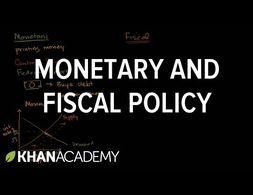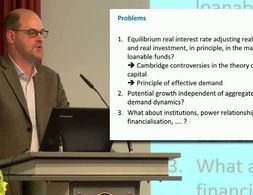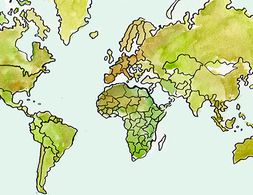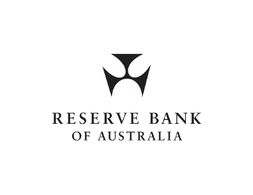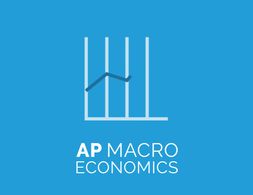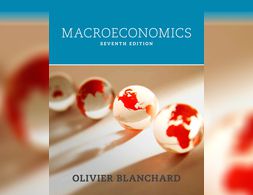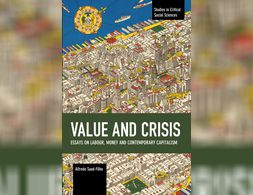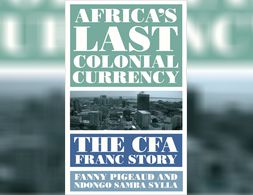✕
32 results
This video by the Khan Academy presents the difference between monetary policy and fiscal policy and how they affect aggregate demand. The video especially elaborates on the basic explanation on how expansionary monetary policy increases aggregate demand via the market for money and the AD-AS model.
Eckhard Hein criticises the mainstream's view of secular stagnation as the result of a negative real equilibrium interest rate. Arguing in a Keynesian spirit with particular reference to Steindl, secular stagnation is considered to be a result of shift in the functional income distribution, and oligopolistic organisation of industries, leading to excess capacity and reluctance to invest. This acts as a drag on effective demand and results in secular stagnation. Distributional policies and public investment can, however, overcome stagnation its tendencies.
This article investigates the set up of the CFA franc zones, its ties to French neocolonialism and its ability to further breed dependency in the former colonies.
As tax day approached, St. Francis College Economics Professors launched their first Economics Week with three days of guest speakers and student research. Randall Wray explains some basic principles of Modern Monetary Theory.
This is an overview of (possibly transformative) proposals to address the economic consequences of the corona crisis
The vast uncertainty surrounding the possible spread of COVID 19 and the duration of the near economic standstill required to combat it make forecasting little different from guessing Clearly this is a whatever it takes moment for large scale outside the box fiscal and monetary policies Carmen M Reinhart Project …
Nathan Tankus created this series to introduce people outside of the inner financial circles of professionals, journalists and policymakers to the basic mechanisms and dynamics of monetary policy.
"Bank Underground" is the staff blog of the Bank of England, founded to publish the views and insights of the people working for one of the world's oldest central banks. The blog covers a wide range of macroeconomic topics, mostly linked to the effects of monetary policy, of course, but not all the time. It provides timely, relevant analysis of contemporary challenges in economic policy and is thus often a perfect primer.
The mandate of central banks has seemed clear for decades : keep inflation low. Nevertheless borders between monetary, financial and economic policy have been blurry even before the pandemic.. Faced with the challenges of the climate crisis, slow growth, unemployment and inequality, does the financial and monetary system need a new constitutional purpose.
Central banking is anything but clear-cut. As this webinar with Benjamin Braun demonstrates, the standard view of central banks as independent public entities that govern financial markets and "print" money is at least partially misleading.
How did the coronavirus almost bring down the Global Financial System? What effects does monetary policy have on inequality? What role do Central Banks have in the social-ecological transformation? How could Central Banks tackle climate change? What is Central Bank Digital Currency?
This essay analyses how the role of central banks changed since the global financial crisis, and how this directional change was accelerated by the outbreak of Covid-19.
After completing the module, participants should have gained a basic understanding of the economic school of thought referred to as "Modern Monetary Theory" and should be able to analyze the monetary processes at play in the economy and evaluate fiscal and monetary policy decisions from an MMT-perspective.
Post-Colonialisms Today researcher Chafik Ben Rouine looks to Tunisia’s post-independence central banking method to provide insight on what progressive monetary policy can look like.
The podcast discusses how to deal with the rising inflation and presents a comparative perspective between the US and the EMU. Basically the speakers discuss whether we are heading to a stagflation in Europe similar to the 1970s and they compare the macroeconomic dynamics in the United States vs. the EMU.
Why did inflation lift of in 2022? Are there differences between the US and the Eurozone and if so, what are they?
In March 2020, the Reserve Bank Board introduced a target for the yield on the three-year Australian Government bond which was discontinued in November 2021. This review examines the experience with the yield target and draws lessons from this experience.
The author discusses the various dimensions of the recent hike in inflation in the context of the United States and policy dilemmas around high inflation GDP decline and unemployment Servaas Storm Institute for New Economic Thinking
This course provides an introduction into the basic concepts of mainstream macroeconomics, including supply and demand in a competitive market, to all the usual introductory macroeconomic topics, and also to both international trade and the Foreign Exchange Market.
Source image New Economic Thinking Youtube channel Some years ago in the aftermath of the great financial crisis GFC of the first decade of the twentieth century Paul Krugman famously remarked that most macroeconomics of the last thirty years was spectacularly useless at best and positively harmful at worst It …
This book is about history of monetary economic thought. From the 18th century with Hume and Smith to the early 20th, the author explains the different schools of thought regarding the monetary theories and policies and specially the central banking theory.
This brief but comprehensive account of the Post Keynesian approach to economic theory and policy is ideal for advanced undergraduate and postgraduate students in economics, public policy and other social sciences. Clear, non-technical and with a strong policy focus, it will also appeal to all of those who are dissatisfied with mainstream economics and wish to explore the alternatives.
In "The Money Problem, "Morgan Ricks argues for a reform of the American monetary system. Taking up foundational questions of monetary policy, he asks: how would we construct a monetary system if we were starting from scratch? What are the characteristics of a monetary instrument?
Since the beginning of the twenty-first century, there has been an unprecedented move towards 'rethinking economics' due to the damages generated by the global financial crisis that burst in 2007-2008. Almost a decade after this crisis, policy is still unable to provide all citizens greater wellbeing or at least an encouraging economic future.
For intermediate courses in economics. A Unified View of the Latest Macroeconomic Events Macroeconomics, Blanchard presents a unified, global view of macroeconomics, enabling readers to see the connections between goods, financial markets, and labor markets worldwide.
Value and Crisis brings together selected essays written by Alfredo Saad-Filho, one of the most prominent Marxist political economists writing today. Divided into two parts, "Essays on the Theory of Value" and "Essays on Contemporary Capitalism," this book examines the labour theory of value from a rich and innovative perspective from which fresh insights are derived.
This course is an introduction to macroeconomics with a specific focus on the euro area. The theoretical part provides a critical presentation of the two key macroeconomic models: the (neo)classical approach and the Keynesian approach. This allows a comparative analysis of important macroeconomic topics:
- unemployment
- inflation
- government debt and Modern Monetary Theory
- banks and financial crises.
The policy-oriented part discusses the monetary policy of the ECB and the specific challenges for fiscal policy in the euro area. The course also presents other euro area specific topics: Optimum currency area, euro crises, Next Generation EU and Green New Deal.
Some economic events are so major and unsettling that they “change everything.” Such is the case with the financial crisis that started in the summer of 2007 and is still a drag on the world economy. Yet enough time has now elapsed for economists to consider questions that run deeper than the usual focus on the immediate causes and consequences of the crisis.
"First published more than a decade ago, Globalizing Capital has remained an indispensable part of economic literature. This classic book emphasizes the importance of the international monetary system for understanding the international economy. The second edition, published in October 2008, has consistently appeared on syllabuses since its release
This book discloses the economic foundations of European fiscal and monetary policies by introducing readers to an array of alternative approaches in economics. It presents various heterodox theories put forward by classical economists, Marx, Sraffa and Keynes, as a coherent challenge to neoclassical theory.
Since 2007, central banks of industrialized countries have counteracted financial instability, recession, and deflationary risks with unprecedented monetary policy operations. While generally regarded as successful, these measures also led to an exceptional increase in the size of central bank balance sheets. The book first introduces the subject by explaining monetary policy operations in normal times, including the key instruments (open market operations, standing facilities, reserve requirements, and the collateral framework).
Colonialism persists in many African countries due to the continuation of imperial monetary policy. This is the little-known account of the CFA Franc and economic imperialism.
Necesitamos cookies. Pincha en “Aceptar” para ayudarnos a hacer de Exploring Economics una mejor plataforma.

